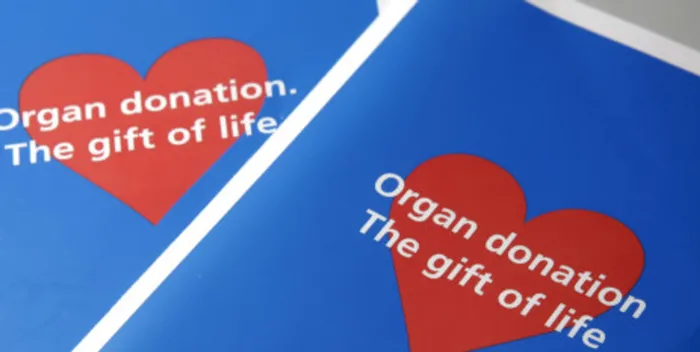In commemoration of National Organ Donor Awareness Month in August, various stakeholders are encouraging South Africans to give the “gift of life”.

Citizens are encouraged to register to be organ donors.
Image: File image
WITH at least 4 300 people requiring a life-saving organ or tissue transplant in the country, their chances of receiving the "gift of life" remains improbable due to the lack of donations.
Samantha Nicholls, the executive director of operations at the Organ Donor Foundation of South Africa, said fewer than 1% of eligible South Africans were registered to be donors.
“There are less than 100 actual organ donors per year, which means there are about 1.6 donors per million population. This is the lowest in the world. However, about 4 300 people, including both adults and children, are on waiting lists. Unfortunately, less than 300 organ transplants are performed each year.”
Nicholls said while all organs were urgently needed, the greatest demand was for kidney donations, as they made up the largest portion of patients on the transplant waiting list.
“The average waiting time for a kidney, if the person does not have a living donor, can be anything from five to 12 years. In respect to the other solid organs such as the liver, heart, pancreas, spleen and lungs, the waiting time varies according to urgency and donor to recipient compatibility.
"However, kidney patients receive dialysis, which temporarily replaces the function of the kidneys. But for patients needing other organs such as a heart, liver, or lungs, there are few or no alternative treatment options. Without a transplant in time, these patients may not survive."
Skin was also desperately needed for burns patients.
Nicholls said recipients often described the gift as a second chance at life.
“Many are deeply grateful and choose to advocate for donor awareness, expressing hope, humility, and deep appreciation for the donor families.”
Reka Dulandas, the KwaZulu-Natal regional transplant manager for Netcare Limited, said the province had among the lowest organ donor rates in the country.
“Compared to provinces like Gauteng and Western Cape, far fewer transplants are performed in KwaZulu-Natal. The demand for organs far exceeds the supply.”
Dulandas said kidneys were the most in-demand organ across the province and South Africa.
“Many patients develop renal failure as a result of hypertension and diabetes, as well as poor lifestyle.”
Dulandas said waiting for an organ transplant could have a profound emotional and psychological impact on individuals.
“While each person's experience is unique, several consistent patterns emerge. The psychological impact includes chronic anxiety and uncertainty as a person questions, ‘Will I live long enough?’ or ‘When will I get a call from the coordinator for a kidney?’.
"In addition, prolonged waiting can lead to hopelessness, sadness, and withdrawal. They also experience a sense of loss of control over their future.
“Many people waiting for a transplant also withdraw socially due to fatigue, illness, or fear of infection. It can also cause strain on relationships as some may feel like a burden. Others experience frustration when loved ones can’t relate to their situation.
"There is also financial stress such as loss of income, hospital and transport costs. Medical aid often doesn’t cover all expenses, causing further anxiety."
Dulandas said becoming an organ donor was one of the most impactful and selfless decisions a person could make.
“It is not just about saving lives; it’s about restoring families, giving second chances, and creating legacies of kindness. One donor can save up to seven lives through organ donation and improve over 50 lives through tissue donation.
“Your choice could mean someone’s mother gets to raise her children, or a student gets to finish school. I believe we should normalise organ donation as a gift of life and not something to fear. In addition, becoming a donor doesn’t require wealth, fame, or strength. It just takes compassion, which could turn someone else’s tragedy into hope."
For more information, visit the foundation’s website at www.odf.org.za or call its toll-free line on 0800 22 66 11.
Four common myths and facts about organ donation:
1. Myth: There is a cost involved in registering as a donor.
Fact: There is no cost to register as a donor. It is completely free.
2. Myth: It is a complicated process to register and you need to undergo tests.
Fact: It is a simple sign up process and only takes a few minutes of your time. You do not need to undergo any tests - this is only done at the time of your death and if you are a suitable candidate for organ or tissue donation.
3. Myth: Doctors will not try to save your life if they know you are a registered donor.
Fact: Doctors and medical staff are trained to do everything possible to save your life. It is their top priority, regardless of whether you are an organ donor or not. In fact, the team that works to save your life is completely separate from the transplant team.
4. Myth: Your body is disfigured or your funeral is delayed.
Fact: Organ and tissue donation is carried out with great care and respect by trained medical professionals. The body is not disfigured in any way. The donor’s body is treated with dignity throughout the process and does not prevent an open-casket or traditional funeral. If the body needs to be buried within a specific time frame, the medical team will make every effort to ensure the timeline is respected.
- Organ Donor Foundation South Africa
Related Topics: